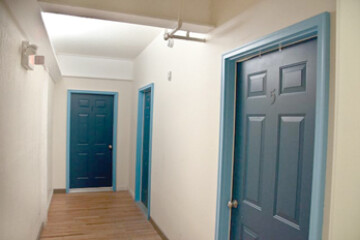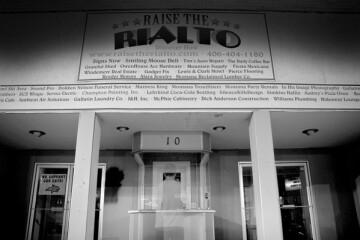Coming Home The STATION Foundation
uses a sense of community and connection to nature to help soldiers return from war
As a country, we are good at sending people to war,” explained Kevin Stacy, founder of The STATION Foundation in Bozeman. He speaks from experience, having deployed with U.S. Special Operations forces 12 times in his 11-year career. And though he felt well-prepared for all of those deployments, he felt less prepared to handle the challenges of readjusting to life at home after life on the battlefield.
“There were no resources to help,” Stacy said. Returning home was “our mess to figure out.” And it was a mess not just for soldiers returning home, but for their spouses and kids as well. Knowing he was not alone in his struggle to transition between two very different worlds, Stacy decided to take action by working with a group of people in Special Operations to develop The STATION Foundation. His organization quietly established a home base in Bozeman two years ago and has been helping Special Operations soldiers and their families adjust to the stresses of war ever since.
Although The STATION is constantly fundraising, Stacy has never used public outreach as a method to raise money. In fact, he has stayed true to the Special Operations community’s culture of quiet professionalism and avoided contact with the media, until recently. Bozeman has many nonprofit organizations—he didn’t want his to be considered just one more group looking for donations. “We want to become part of the community without having our hand out all the time,” he explained.
R4: Run, Ruck, Ride Relay
The group’s first public event will be held on September 11 to pay homage to the tragedy that started the war on terror, an undertaking that has kept Special Operations forces working at a breakneck pace for the past 13 years.
Teams from San Diego to Boston will participate in the R4: Run, Ruck, Ride Relay, an event designed to raise awareness of the fight against terrorism and honor those lost on and since September 11, 2001. Locally, Stacy is recruiting 15 relay teams that represent a cross-section of the Bozeman community. Military personnel will participate alongside teams from local businesses, Montana State University, local firefighters, and other first responders.
Team members will take turns working through a course that includes a 5K run, 5K ruck (hiking while carrying at least 20 pounds), and a 5K ride or row. To mimic conditions often experienced by Special Operations soldiers, the course will not be announced until teammates arrive for the relay. Stacy recalled being deployed on his son’s first birthday with no prior warning. He could not tell his wife where he was going and he did not know when he would be back. So, relay teams will not know where they are going until they get to the course.
Stacy wants to “keep [the event] small and grow into it.” Anyone interested in participating can contact him directly at 406-924-4741. Those who would like to learn more about the organization, show their support, and cheer for relay teams should attend the event’s kickoff at the Bogert Place Pavilion at 5:30pm on September 11. All of the money raised will go directly to funding The STATION’s programs, and Stacy hopes people will participate beyond just writing a check. He and others will be at the kickoff to talk about the impact war has on soldier’s families and what can be done to help them transition away from combat.
Helping Families Reconnect
The team at The STATION Foundation tailors programs to meet the needs of the individuals and families they serve. Soldiers returning from combat deal with different issues, so The STATION tries to cater to their needs. “Our program is built around people instead of being built around an expected answer,” Stacy explained. Families with a member who has recently returned from active duty, in addition to spouses and children of those on active duty in Special Operations, stay at a private, local lodge for 10 – 12 days.
While different guests are involved in different activities, the treatment formula remains consistent. Families are given a couple of days to acclimate to their new environment before embarking on an exciting trek or trip. Outdoor adventures help participants find strength within themselves and connections with other family members. Stacy found tremendous strength and healing the first time he visited the mountains and rivers surrounding Bozeman and felt his fellow soldiers would have a similar experience.
Helping Communities Reconnect
Once the adventure concludes, community service begins. Soldiers and families visiting The STATION help small local businesses as a team-building and community outreach exercise. They learn skills they can bring back to their own communities. But, perhaps more importantly, they talk to each other as they work side-by-side. They share experiences and feelings they might be reluctant to divulge in a formal therapy setting. A group recently helped build a pole barn at Alpine Organics, a Three Forks farm. They got to know each other, got dirty, and had a great time, according to Stacy.
Groups from The STATION also spend time talking to ROTC members. They explain the importance of leadership using their real-life combat experiences to frame the discussion. They have helped at Mystery Ranch and Northern Lights and, with the help of Susan Tate and Raising the Lantern, have found that yoga reduces the anxiety caused by Post Traumatic Stress.
During the summer, The STATION Foundation runs two summer survival schools for children in the Special Operations community at a camp south of Big Timber. One of the sessions allows kids to reconnect with parents that have been away on deployment. The other allows kids who have lost a parent to establish a connection with someone who served in combat with that parent. It is a unique opportunity for kids struggling with loss to find a mentor that understands what they are going through.
Fostering understanding and raising awareness are central to The STATION Foundation’s mission. Focusing on the personal wellness of community members, including military personnel, builds healthy communities. The STATION continues to find its place in the community and put down roots, and has so far helped 60 different Special Operations families get to know each other again after long and difficult absences. For more information, visit www.thestationfoundation.org. To contribute by purchasing an R4 t-shirt, visit www.booster.com/tsfr42014




